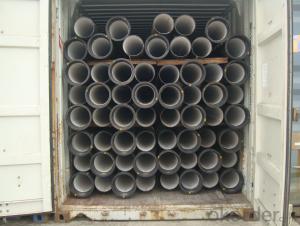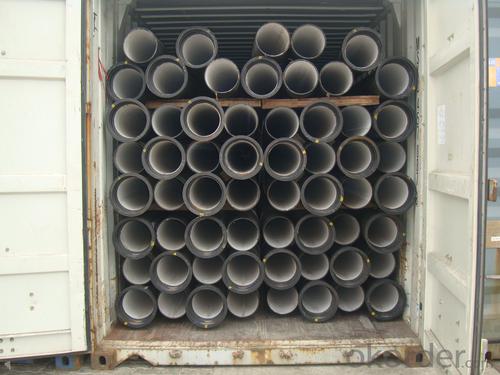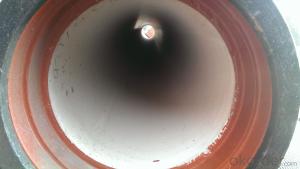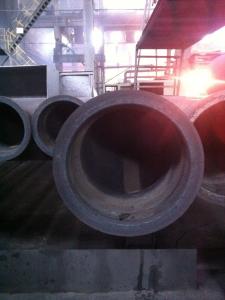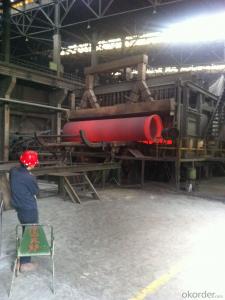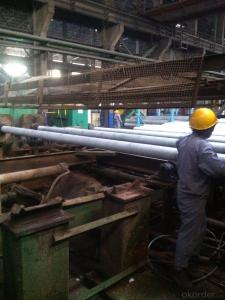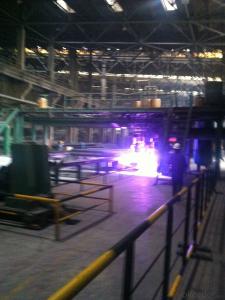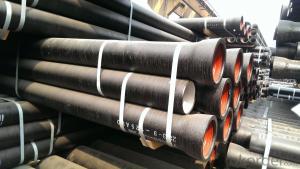DUCTILE IRON PIPES AND PIPE FITTINGS DN900
- Loading Port:
- Tianjin
- Payment Terms:
- TT OR LC
- Min Order Qty:
- 25 m.t
- Supply Capability:
- 30000 m.t/month
OKorder Service Pledge
OKorder Financial Service
You Might Also Like
Material : Ductile Cast Iron
Size Range : DN 80mm to DN 2000mm
Unit Effective Length : 6m or 5.7m
Manufacture Standard: ISO 2531:1998/ EN 545:2006/EN 598:2007
Annual capacity : 200,000 tons
Coating Exterior: Zinc 130g/m2 according to ISO 8179-1 and bitumen coating 70 microns.
Cement Interior: Portland Cement/ High Alumina Cement/ Sulphate Resisting Cement Lining according to ISO 4179
Special requirements on external coating and internal lining can be applied
We also provide accessories such as SBR/EPDM rubber gaskets, lubricant paste, pipe caps, PE sleeves, etc.
Additional Parts:
Each pipe is strictly inspected according to related standard to ensure permanently high performance.
Easy Installation at site and service free for life
Long Service Lifespan
Quotation will arrive you within 24hours once we get your inquiry.
We guarantee offering you a competitive price.
A copy of original inspection reports of pipes will be offered after shipment.
Photos of loading process will be sent to the customer after shipment effect.
We will follow-up the delivery progress after shipment effect and update to the customer on weekly basis.
- Q: What is the average cost of ductile iron pipes?
- The cost of ductile iron pipes can differ based on factors like diameter, length, and location, resulting in varying averages. Typically, the price range for ductile iron pipes is $30 to $100 per linear foot. To illustrate, a 6-inch diameter ductile iron pipe that is 20 feet long could cost approximately $600 to $2,000. It is crucial to understand that these figures are approximations and subject to alteration due to market conditions, project specifications, and supplier pricing. Thus, it is advisable to consult local suppliers or contractors for precise pricing details regarding specific projects.
- Q: How do ductile iron pipes handle pressure surges in pumping stations?
- Ductile iron pipes are known for their strength and durability, making them well-equipped to handle pressure surges in pumping stations. These pipes have a high resistance to impact and are designed to withstand the sudden increase in pressure that occurs during surge events. Additionally, their flexible nature allows them to absorb and distribute the force exerted by the surge, minimizing the risk of pipe failure or damage. Overall, ductile iron pipes are a reliable choice for handling pressure surges in pumping stations.
- Q: Are ductile iron pipes suitable for bridge crossings or crossings under roadways?
- Yes, ductile iron pipes are suitable for bridge crossings or crossings under roadways. They possess high strength and durability, making them capable of withstanding heavy loads and traffic conditions. Additionally, their flexibility and resistance to external pressures make them an ideal choice for such applications, ensuring long-lasting and reliable performance.
- Q: Can ductile iron pipes be used for above-ground installations?
- Yes, ductile iron pipes can be used for above-ground installations. They have excellent strength and durability, making them suitable for various applications, including above-ground installations where corrosion resistance and structural integrity are required.
- Q: How does ductile iron pipe resist internal corrosion?
- The resistance of ductile iron pipe to internal corrosion is achieved through a combination of distinct material properties and the use of protective coatings. To start, ductile iron, also known as nodular cast iron, is created by incorporating magnesium into molten iron, resulting in a graphite structure that is nodular or spherical in shape. This unique structure enhances the material's flexibility and elasticity, reducing the likelihood of cracking or fracturing when subjected to stress. Moreover, ductile iron possesses a dense microstructure with a high carbon content, serving as a barrier that prevents corrosive elements from penetrating the surface of the pipe. This inherent resistance to corrosion makes ductile iron pipe suitable for transporting various fluids, including water, sewage, and chemicals, without the risk of deterioration over time. Additionally, ductile iron pipes are often lined with protective coatings internally, further augmenting their resistance to corrosion. These coatings, such as cement mortar or epoxy, form a barrier between the pipe's surface and the fluid it carries, minimizing direct contact and decreasing the likelihood of corrosion. These linings are implemented during the manufacturing process, ensuring consistent and durable protection along the entire length of the pipe. In conclusion, ductile iron pipe successfully resists internal corrosion due to its material composition, including the nodular graphite structure and high carbon content, as well as the application of protective coatings. This combination of factors guarantees the longevity and dependability of ductile iron pipes in various applications, even in environments prone to corrosion.
- Q: How does ductile iron pipe perform in areas with high groundwater salinity?
- Due to its inherent resistance to corrosion, ductile iron pipe is highly effective in areas with high groundwater salinity. The presence of elevated levels of salt and minerals in the groundwater can lead to the corrosion and deterioration of certain materials, but ductile iron is highly resilient to this type of corrosion. Its composition and manufacturing process make it less susceptible to damage from corrosive elements found in high salinity water. The primary reason for the corrosion resistance of ductile iron pipe lies in its protective iron oxide coating, which naturally forms on both the interior and exterior surfaces of the pipe. This coating acts as a barrier, preventing direct contact between the pipe and the corrosive elements present in the groundwater. Additionally, ductile iron pipes are often lined with cement mortar or a protective epoxy coating, further enhancing their resistance to corrosion and providing an extra layer of protection. Moreover, ductile iron pipe boasts an extended lifespan, often surpassing 100 years, making it an ideal choice for areas with high groundwater salinity. Its durability and resistance to corrosion ensure that it can withstand the harsh conditions associated with high salinity environments, minimizing the frequency of repairs or replacements. In conclusion, ductile iron pipe is an exceptional option for areas with high groundwater salinity due to its corrosion resistance properties. Its protective iron oxide coating, along with optional linings, offers a dependable and long-lasting solution, guaranteeing the integrity and performance of the pipe system even in demanding environments.
- Q: General cast iron prices now
- Regular cast iron prices now range between 5000 and 8000.Ductile iron is a kind of high strength cast iron material developed in 50s twentieth Century, its comprehensive performance is close to the steel, it is based on its excellent performance, has been successfully used in casting complex stress, strength, toughness and wear resistance requirements of the higher parts. Nodular cast iron has developed rapidly to be second only to grey cast iron and widely used as cast iron material. The so-called "iron instead of steel", mainly refers to ductile iron.
- Q: What are the different pressure ratings available for ductile iron pipe?
- The pressure ratings available for ductile iron pipe typically range from 150 psi to 350 psi, depending on the size and application of the pipe.
- Q: Can ductile iron pipes be used for wastewater reuse projects?
- Ductile iron pipes are suitable for wastewater reuse projects due to their various properties. Firstly, they possess high strength and durability, enabling them to withstand the pressure and load requirements of wastewater systems. Additionally, they exhibit outstanding corrosion resistance, a crucial factor in wastewater applications where the presence of chemicals and corrosive substances is common. Moreover, the smooth internal lining of ductile iron pipes reduces friction and enhances the flow of wastewater. This is essential for efficient transportation and distribution of wastewater in reuse projects. Furthermore, ductile iron pipes are renowned for their ease of installation and maintenance. They can be effortlessly connected using various joint options, facilitating quick and efficient installation. Additionally, their long service life reduces the necessity for frequent replacements and minimizes maintenance costs. In conclusion, the properties of ductile iron pipes make them a suitable option for wastewater reuse projects, providing strength, durability, corrosion resistance, smooth flow, and ease of installation and maintenance.
- Q: The difference between ductile iron pipe and steel pipe used in pipe jacking
- Comparison between ductile iron pipe and universal cast iron pipe: the process of making ductile iron pipe is cast by adding alkaline earth metal or rare metal such as magnesium and calcium in the raw material of common cast iron pipe.
Send your message to us
DUCTILE IRON PIPES AND PIPE FITTINGS DN900
- Loading Port:
- Tianjin
- Payment Terms:
- TT OR LC
- Min Order Qty:
- 25 m.t
- Supply Capability:
- 30000 m.t/month
OKorder Service Pledge
OKorder Financial Service
Similar products
Hot products
Hot Searches
Related keywords
